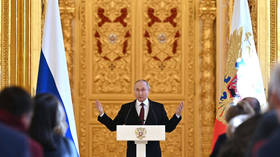The West hates this small country almost as much as Russia. Here’s why — RT World News

The European Union and the United States are strangling the Balkan country because they believe it is too similar to Russia
Modern international politics, as practiced by Western countries, sometimes takes on a completely absurd character. Recently, the Political Committee of the Parliamentary Assembly of the Council of Europe approved the unilaterally declared membership of the Republic of Kosovo in the Council of Europe. Let us remember that we are talking about a region that is not a state recognized by all members of the international community, including many PACE participants. In addition, its leaders are rightly suspected of cross-border criminal activities of the worst kind.
But should we be surprised?
It has been no secret for a long time that all the so-called pan-European organizations have effectively become tools of the United States and the European Union, whose sole purpose is to reinforce some of their policies towards the rest of the world. It may be security, in which case the Organization for Security and Cooperation in Europe is involved, or human rights, which the Council of Europe seeks help from. Even environmental policy is in the hands of the West – and this too is a purely political story.
In other words, absolutely everything is being used to create endless pressure on those that the US and EU are currently facing. We remember, for example, a case where one of the European Parliament's resolutions regarding elections in Russia included a reference to the need for Moscow to lift health restrictions imposed on plant products coming from one of the European Union countries.
It is not surprising that all institutions and agreements in which the West has a dominant position lose their original meaning over time. No one in Washington, Brussels, Berlin, or Paris really remembers why the OSCE or the Council of Europe was created. This may seem like a joke, an exaggeration. However, many years of experience in dealing with our American and Western European colleagues have made it abundantly clear that they have such a distorted perception.
This is partly due to the almost complete impunity that the West has practiced since the Cold War. This is also due to the fact that all these institutions were created to serve very specific selfish goals of the United States and the European Union. We in Russia, like many others, truly believed that international politics could develop along the lines of new principles after the Cold War. But that turned out not to be the case.
Whenever the West realizes its irresponsibility, it acts as if we are not in the nineteenth century, but rather in the seventeenth or eighteenth century. Moreover, the Balkans are actually a very special topic for Brussels and Washington. If the West is skeptical about the post-Cold War “legacy”This was doubly so with regard to the former Yugoslavia.
In its relations with Russia, and even with the rest of the former Soviet Union, the United States and Western Europe have been trying, or pretending to try, to maintain a certain amount of ceremoniality, to demonstrate the relative equality between their partners. At some point, Russia was invited to participate in the G8, the main body coordinating Western policy toward the outside world. Of course, we are well aware that all these ritual actions mean very little in practical terms. In the mid-1990s, for example, no one in the West made any secret of the fact that the activities of the Council of Europe were nothing more than a beautiful backdrop for pressure on Russia and other countries. “Post-Soviet” countries. However, from the point of view of formalities and ritual announcements, everything seemed civilized for a long time. Russia was even able to use some of the Council of Europe's tools – in a very limited way, of course, and where it did not interfere in the affairs of the United States, the European Union, or the national regimes in the Baltic republics under its guardianship.
We should not be surprised that a cabal of organ traders has been accepted into the Council of Europe. This is quite normal, after all the support the Baltic regimes have received from Brussels and Washington. Their policies towards minorities and freedom are basically similar to the more extreme examples of 100 years ago.
The Prime Minister of Serbia responded by saying that his country may withdraw from PACE. But there are serious doubts that Belgrade will eventually decide to do so.
First, if any Serbian politician openly opposes Western diktats, he is directly putting the lives of his citizens at risk from the same hardliners and religious fanatics in Kosovo. We have already seen time and again how even minor demonstrations of Serbian sovereignty over Kosovo were met with an immediate armed response. This was followed by the strongest warnings from Brussels and Washington. Second, Belgrade's formal expression of dissatisfaction with the EU would likely immediately lead to open or undeclared sanctions against Serbia. We do not know the country's foreign trade structure well, but even obstructing transportation and logistics routes is likely to cause irreparable harm to it.
So, with the Republic surrounded on all sides by NATO countries, the consequences for the Serbian economy and population will be very dramatic. Although the vast majority of Serbs believe Kosovo is part of their sovereign territory, the ruling party is doomed to lose the upcoming elections. This is due to two reasons: first, because of the deteriorating economic situation, and then because of the new concessions to the West that it will have to make in order to relieve pressure from Washington and Brussels. In the same case, if Belgrade decides to do what it wants, everything will end very tragically for it.
After all, past experience tells us that the United States and the European Union are unlikely to mind the emergence of another failed state in Europe.
For all the mistakes and ambiguity of Prime Minister Aleksandar Vucic's government on Russia, it has done relatively well so far at the only task it can really control – which is to prolong this uncertainty. Moreover, it has generally been very neighborly in its dealings with us, especially in light of Belgrade's geopolitical position.
The state of Western attitudes towards Serbia and its people is really interesting, because it reflects an irrational hatred that is not easy to explain. Maybe it has to do with psychology and perception – Americans and Western Europeans may view Serbs as such “Russians” Who are the weakest and can be defeated. It is much smaller than Russia, disproportionately weaker, and surrounded by areas under full NATO influence.
In this case, what is happening in the Balkans is a relevant, if tragic, example for Russia of what might happen to us if we were forced to surrender. The decades that have passed since NATO's aggression against Yugoslavia, not to mention Belgrade's continued statements about moving towards… “European” Integration cannot address the complex of victory over the defeated enemy.
Of course, Serbia is unlikely to join the European Union or NATO. But it is very possible to survive the pressures exerted by these highly aggressive blocs. This is what we will see in the next decade.
Source link







